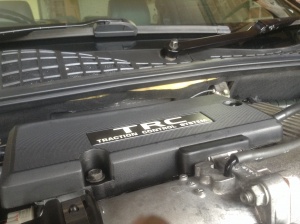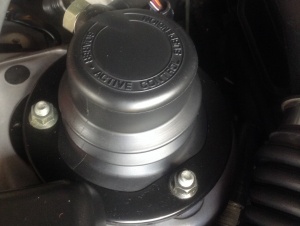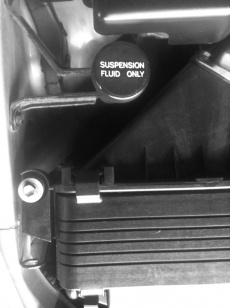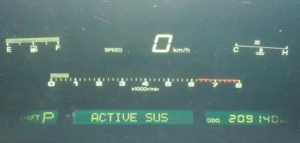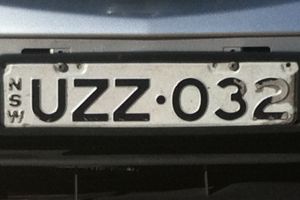How to recognize a UZZ32 active Soarer
The UZZ32 "active" Soarers are externally (and internally) similar to the more common base models and can thus be difficult to distinguish. This page summarises the "little signs" that a Soarer is, may be, or is not, a UZZ32 model.
Definitive Indications
Depending on the circumstances of the sighting and information available (eg chassis number, view or photos of the vehicle), look for:
- a Toyota chassis/frame number starting with UZZ32-xxxxxxx; this can be found on the Build Plate as well as on the firewall
- distinctive "concertina" suspension strut covers with "active" logo visible in the engine bay
- four-wheel steering (steering rack visible underneath the vehicle, or rear wheels angling slightly when front wheels fully turned at low speed
- Suspension Fluid filler and dipstick visible under the bonnet, (located on the right-hand side of the engine bay, near the air box/filter.)
- hydraulic suspension components visible in the wheel well areas
- configuration of switches, ie switch, blank, switch in front of the automatic gear selector
- dash cluster showing "active high"' status light (when suspension is in high mode)
- dash including "active suspension" during the power-on self-test (or when manually pressing the 'scroll' button)
- unusual (for a Soarer) location of the left-hand-side windscreen washer bottle
If the Soarer you are looking at meets any of the above criteria, it is almost certainly an Active UZZ32 Soarer.
Circumstantial Evidence
Less conclusive, but circumstantial evidence can also be used to help ascertain that the vehicle is potentially, but not necessarily, an "active":
- on the track (ie virtually no leaning under heavy cornering / braking / acceleration
- weight: the "active" is the heaviest Soarer of them all at 1730 Kg
- presence of expensive options (eg the "factory" reversing camera) may increase the chance that it is a UZZ32, because someone ordering the top-of-the-range model may be more likely (financially and psychologically) to tick the options box when purchasing their new vehicle
- if the active suspension is in need of maintenance, the suspension may - at one or more corners - gradually sag when parked
- a non-standard number plate making reference to UZZ32 (eg, in NSW, there are at least two vehicles with number plates in the format UZZ32<something>)
- if the suspension is in need of maintenance, the vehicle may also exhibit "bounce", typically during low-speed cornering on a bumpy surface
- EMV screens were included on UZZ32 and UZZ31 Soarers
- Factory 16" wheels were included on both UZZ32 and JZZ30 Soarers
- if both Factory 16" wheels and EMV are present, it "should" be an Active (though it is common that the upgraded wheels are added to a UZZ31, and possible (though less likely) that the EMV has been added to a JZZ30).
- Similarly, the Suspension On/Off switch (in the boot) was used on both the UZZ31 and UZZ32 series Soarers
If the Soarer you are looking at meets one or more of the above criteria, it may turn out to be an Active UZZ32.
Evidence suggesting it is NOT a UZZ32
Conversely, certain configuration and options were not available on the "active" Soarers. For example:
- the factory-fitted sun-roof was not available until ???? meaning that, eg an early 91 model with a Toyota sunroof is unlikely to be an active
- the presence of side skirts, a front grill, or late-model (97+) tail lights or rear spoiler would (unless retro-fitted as an upgrade) indicate a '97 or later model, by which time the UZZ32 was no longer being manufactured
- the engine size is anything other than 4.0 l
- the engine type is not a V8
- the engine is turbo-charged (unless aftermarket)
- the chassis number starts with anything other than UZZ32, eg UZZ30, UZZ31, JZZ30. However, vehicles registered in Australia receive a "new" (additional) chassis number (typically in the format 1MP0RTxxxxxxxxx), which has no relevance to the vehicle being a UZZ32 or not.
- the date of manifacture is earlier than 1991, or later than 1996. However, vehicles imported to and complianced for use in Australia will sometimes list the compliance date as the "date of manufacture".
- non-leather seats
- references to TEMS and/or air suspension
- there is no EMV screen (unless it has been removed or upgraded to a non-standard model).
- there is no Suspension on/off switch in the boot.
- the wheels are the "basket-weave" type (active Soarers had the same wheels as the TT models, with two styles available depending on the year of manufacture)
- there is no TRC. Traction control was available as an option on some a soarers but standard on UZZ32
- Aftermarket height controllers are often found on UZZ31 (airbag) models, but rarely on UZZ32s
If the vehicle meets any of these criteria, it is almost certainly not an active Soarer.
Caution
It must also be remembered that a number of UZZ32 Soarers have had the suspension components replaced by more conventional ones. Similarly, it is possible (albeit unlikely) that components from a UZZ32 Soarer have been installed in a non-active Soarer.

